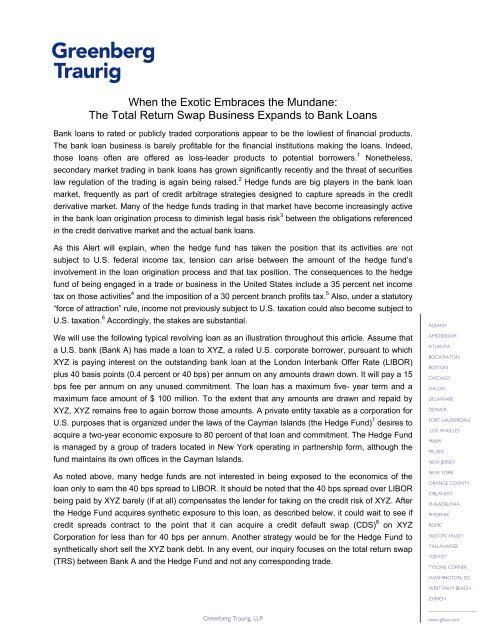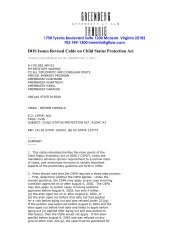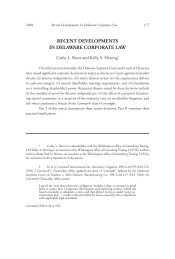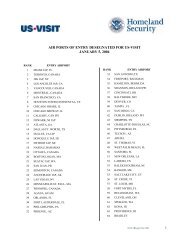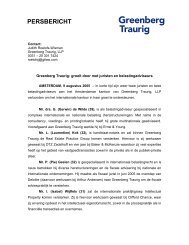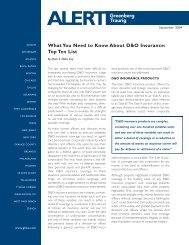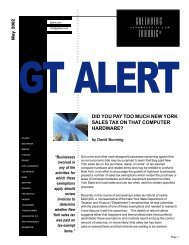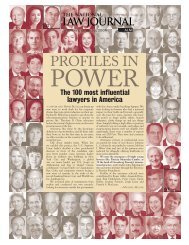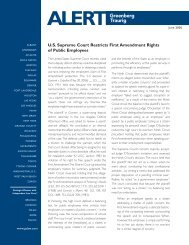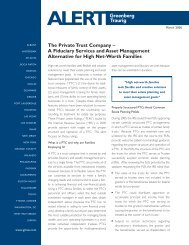The Total Return Swap Business Expands to Bank Loans
The Total Return Swap Business Expands to Bank Loans
The Total Return Swap Business Expands to Bank Loans
Create successful ePaper yourself
Turn your PDF publications into a flip-book with our unique Google optimized e-Paper software.
When the Exotic Embraces the Mundane:<strong>The</strong> <strong>Total</strong> <strong>Return</strong> <strong>Swap</strong> <strong>Business</strong> <strong>Expands</strong> <strong>to</strong> <strong>Bank</strong> <strong>Loans</strong><strong>Bank</strong> loans <strong>to</strong> rated or publicly traded corporations appear <strong>to</strong> be the lowliest of financial products.<strong>The</strong> bank loan business is barely profitable for the financial institutions making the loans. Indeed,those loans often are offered as loss-leader products <strong>to</strong> potential borrowers. 1 Nonetheless,secondary market trading in bank loans has grown significantly recently and the threat of securitieslaw regulation of the trading is again being raised. 2 Hedge funds are big players in the bank loanmarket, frequently as part of credit arbitrage strategies designed <strong>to</strong> capture spreads in the creditderivative market. Many of the hedge funds trading in that market have become increasingly activein the bank loan origination process <strong>to</strong> diminish legal basis risk 3 between the obligations referencedin the credit derivative market and the actual bank loans.As this Alert will explain, when the hedge fund has taken the position that its activities are notsubject <strong>to</strong> U.S. federal income tax, tension can arise between the amount of the hedge fund’sinvolvement in the loan origination process and that tax position. <strong>The</strong> consequences <strong>to</strong> the hedgefund of being engaged in a trade or business in the United States include a 35 percent net incometax on those activities 4 and the imposition of a 30 percent branch profits tax. 5 Also, under a statu<strong>to</strong>ry“force of attraction” rule, income not previously subject <strong>to</strong> U.S. taxation could also become subject <strong>to</strong>U.S. taxation. 6 Accordingly, the stakes are substantial.We will use the following typical revolving loan as an illustration throughout this article. Assume thata U.S. bank (<strong>Bank</strong> A) has made a loan <strong>to</strong> XYZ, a rated U.S. corporate borrower, pursuant <strong>to</strong> whichXYZ is paying interest on the outstanding bank loan at the London Interbank Offer Rate (LIBOR)plus 40 basis points (0.4 percent or 40 bps) per annum on any amounts drawn down. It will pay a 15bps fee per annum on any unused commitment. <strong>The</strong> loan has a maximum five- year term and amaximum face amount of $ 100 million. To the extent that any amounts are drawn and repaid byXYZ, XYZ remains free <strong>to</strong> again borrow those amounts. A private entity taxable as a corporation forU.S. purposes that is organized under the laws of the Cayman Islands (the Hedge Fund) 7 desires <strong>to</strong>acquire a two-year economic exposure <strong>to</strong> 80 percent of that loan and commitment. <strong>The</strong> Hedge Fundis managed by a group of traders located in New York operating in partnership form, although thefund maintains its own offices in the Cayman Islands.As noted above, many hedge funds are not interested in being exposed <strong>to</strong> the economics of theloan only <strong>to</strong> earn the 40 bps spread <strong>to</strong> LIBOR. It should be noted that the 40 bps spread over LIBORbeing paid by XYZ barely (if at all) compensates the lender for taking on the credit risk of XYZ. Afterthe Hedge Fund acquires synthetic exposure <strong>to</strong> this loan, as described below, it could wait <strong>to</strong> see ifcredit spreads contract <strong>to</strong> the point that it can acquire a credit default swap (CDS) 8 on XYZCorporation for less than for 40 bps per annum. Another strategy would be for the Hedge Fund <strong>to</strong>synthetically short sell the XYZ bank debt. In any event, our inquiry focuses on the <strong>to</strong>tal return swap(TRS) between <strong>Bank</strong> A and the Hedge Fund and not any corresponding trade.ALBANYAMSTERDAMATLANTABOCA RATONBOSTONCHICAGODALLASDELAWAREDENVERFORT LAUDERDALELOS ANGELESMIAMIMILAN *NEW JERSEYNEW YORKORANGE COUNTYORLANDOPHILADELPHIAPHOENIXROME *SILICON VALLEYTALLAHASSEETOKYO **TYSONS CORNERWASHINGTON, DCWEST PALM BEACHZURICHGreenberg Traurig, LLP____________________www.gtlaw.com
I. Operation of a Typical TRS on a <strong>Bank</strong> LoanMany of the hedge funds engaged in these types of arbitrage strategies will not acquire a bank loan directly.Instead, the hedge fund will acquire a synthetic exposure <strong>to</strong> the loan through derivatives. <strong>Bank</strong> A and theHedge Fund enter in<strong>to</strong> a two-year TRS regarding 80 percent of the funded and unfunded amounts of thebank loan. 9 During the term of the TRS, <strong>Bank</strong> A pays 80 percent of the interest and commitment fees that itreceives on the loan <strong>to</strong> the Hedge Fund. In exchange, the Hedge Fund agrees <strong>to</strong> pay the product of (x)LIBOR plus a spread and (y) 80 percent of the outstanding drawn amount by XYZ, on the loan made by<strong>Bank</strong> A. Also, the Hedge Fund would either make an upfront swap payment <strong>to</strong> <strong>Bank</strong> A or place collateralwith <strong>Bank</strong> A, equal <strong>to</strong> a percentage of the amounts drawn on the loan, <strong>to</strong> secure its obligations. 10 <strong>The</strong>collateral requirements will change over time as the amounts drawn on the loan change as well for changesin the value of the loan itself. Under the TRS, at the end of two years, <strong>Bank</strong> A will pay an amount equal <strong>to</strong>the appreciation in 80 percent of the bank loan <strong>to</strong> the Hedge Fund. <strong>The</strong> loan could appreciate if, forexample, the credit quality of XYZ improves during this period. Conversely, if the value of the bank loan atthe end of the term of the TRS is less than its initial value, the Hedge Fund will pay that diminution in value<strong>to</strong> <strong>Bank</strong> A. Thus, the Hedge Fund is economically exposed <strong>to</strong> 80 percent of the risk and reward on the loan.At least two independent companies provide pricing for bank loans and quotes from those companies arecommonly used <strong>to</strong> ascertain the value of bank loans. 11<strong>The</strong> bank loan TRS does not provide the Hedge Fund with any direct rights against XYZ regarding any ofthe covenants and representations made by XYZ nor does it require <strong>Bank</strong> A <strong>to</strong> actually hold the loan. Forexample, if the bank loan contains coverage tests (asset <strong>to</strong> liabilities or income <strong>to</strong> expenses), the HedgeFund would not be entitled <strong>to</strong> send out any notices of default or otherwise deal directly with the borrower.Those rights are left with <strong>Bank</strong> A. If XYZ is placed in<strong>to</strong> bankruptcy receivership, the Hedge Fund would not,by virtue of the TRS transaction, be entitled <strong>to</strong> receive reports from XYZ or otherwise exercise any rights of adebt holder in the bankruptcy. In general, any of those events would trigger an acceleration and, therefore,settlement of the TRS or a mark-<strong>to</strong>- market of relative obligations. Also, the obligations of <strong>Bank</strong> A <strong>to</strong> theHedge Fund are not secured by the underlying bank loan. It is common for the swap confirmation <strong>to</strong> containan indemnity provision under which the Hedge Fund is required <strong>to</strong> indemnify <strong>Bank</strong> A against any costs orexpenses incurred regarding the underlying loan.It is also worth noting that recent innovations in this market have included the development of portfolioswaps. In those swaps, the financial institution, <strong>Bank</strong> A, will enter in<strong>to</strong> a supplement under which it willprovide the Hedge Fund with derivative exposure <strong>to</strong> a number of loans that it has made <strong>to</strong> corporateborrowers. <strong>The</strong> supplement may relate <strong>to</strong> loans <strong>to</strong> be made as well as loans already held by <strong>Bank</strong> A (andmight provide <strong>Bank</strong> A with discretion, within predetermined guidelines, <strong>to</strong> add loans meeting certain criteria<strong>to</strong> the swap with the Hedge Fund).Greenberg Traurig, LLP
II.<strong>The</strong> TRS as an NPC for Federal Tax PurposesSeveral U.S. tax regulations contain a definition of a swap or notional principal contract (also known as aswap). <strong>The</strong> general definition (and the definition in the source rules, which is, for purposes of this article,identical) reads:A notional principal contract is a financial instrument that provides for the payment of amounts by oneparty <strong>to</strong> another at specified intervals calculated by reference <strong>to</strong> a specified index upon a notionalprincipal amount in exchange for specified consideration or a promise <strong>to</strong> pay similar amounts. 12Objective financial information is defined as objectively determinable financial information that is not withinthe control of any of the parties <strong>to</strong> the swap. 13 Objective financial information does not include the value ofthe s<strong>to</strong>ck of one of the parties <strong>to</strong> the swap or its dividends, profits, and so forth.An issue exists whether a bank loan that is extended by one of the parties <strong>to</strong> the swap (<strong>Bank</strong> A in ourexample) is objective financial information. That issue is posed because <strong>Bank</strong> A negotiated the loan, has theright <strong>to</strong> accept or reject requests for draw-downs, and is otherwise servicing the loan. <strong>The</strong> performance ofthe loan, however, is not within the control of <strong>Bank</strong> A; its value will <strong>to</strong>tally depend on the performance of theborrower — something not within the control of <strong>Bank</strong> A. Accordingly, a strong argument exists that the loanperformance should be considered objective financial information within the meaning of the regulationdefining swaps.<strong>The</strong> TRS between the Hedge Fund and <strong>Bank</strong> A appears <strong>to</strong> meet the literal definition of a swap. Although thenotional amount will vary over the life of the swap with draws on the loan itself, that changing notionalamount affects both parties equally. Specifically, as the loan amount fluctuates, the notional amount onwhich the payments made by Hedge Fund are calculated likewise fluctuates. Conversely, because <strong>Bank</strong> A isrequired <strong>to</strong> pay an amount equal <strong>to</strong> all interest and fees received on the underlying bank loan, the notionalamount applicable <strong>to</strong> <strong>Bank</strong> A’s payments fluctuates in a like manner. Both parties are making payments atspecified intervals. Applicable regulations specifically permit a contract with a notional amount that variesover the life of the contract <strong>to</strong> be taxed as a swap, provided that the variance is based on objective financialinformation. 14 Since any variance will relate <strong>to</strong> actions by a third-party borrower, that requirement should besatisfied. 15 <strong>The</strong> loan itself is “notional” inasmuch as the swap does not convey any direct ownership rightsregarding the loan. As noted above, the swap does not allow the Hedge Fund <strong>to</strong> vote on matters submitted<strong>to</strong> credi<strong>to</strong>rs nor does it require a collateral deposit equal <strong>to</strong> the full amount loaned by <strong>Bank</strong> A.A. Issues as <strong>to</strong> NPC QualificationEven assuming the form of the swap meets the criteria for a “notional principal contract,” the question ariseswhether a “<strong>to</strong>tal return” derivative regarding an asset could constitute a transfer of tax ownership of the asset<strong>to</strong> the “long” counterparty. 16 Most practitioners view that issue as particularly acute when the underlyingasset is nonfungible property, which might include a privately originated bank loan. As long as thereferenced asset does not secure the swap, substantial arguments can be made that a <strong>to</strong>tal return swapregarding a nonfungible asset can be structured in such a manner as <strong>to</strong> avoid a transfer of tax ownership.<strong>The</strong> major feature of a bank loan TRS that raises an issue <strong>to</strong> whether that contract should be a taxed as aswap is whether it would be considered <strong>to</strong> have a different notional amount for <strong>Bank</strong> A (which includespayments on unfunded amounts) and for the Hedge Fund (whose notional is only the drawn amounts). Evenif unused commitment fees are not interest for tax purposes, 17 they are earned in connection with the loanGreenberg Traurig, LLP
and collecting and disbursing dividends received on the s<strong>to</strong>ck. <strong>The</strong> issue was whether the trust wasengaged in a trade or business within the United States so as <strong>to</strong> treat the beneficiary of the trust as soengaged. 27 <strong>The</strong> court stated that those activities do not constitute the conduct of a trade or business “nomatter how large the estate or extended the work.” 28 In contrast <strong>to</strong> those (and other similar) cases, inInverworld Inc. v. Comm’r, a Mexican corporation engaged in the financial services business received clientfunds in the United States, placed those funds with third parties, and executed s<strong>to</strong>ck trades in the UnitedStates on behalf of clients. On those facts, the foreign corporation was considered <strong>to</strong> be engaged in theconduct of a trade or business in the United States.A regulation proposed in 1998 (and still in proposed form as of the date hereof) makes clear that theprinciples of the above cases and the investment safe harbor apply <strong>to</strong> derivative transactions. 29 Thatregulation states that nondealer transactions in derivatives do not constitute the conduct of a trade orbusiness in the United States. Nondealer derivative transactions include interest rate swaps and equityswaps, as well as derivatives in a “note, bond, debenture or other evidence of indebtedness.” 30 A bank loanTRS should be within that definition and, provided that the Hedge Fund is not acting as a derivatives dealers(which is very unlikely), that proposed regulation offers additional support for the conclusion that proprietaryinvestment activities (whether actual or synthetic) are not trade or business activities. In at least one privateletter ruling, the IRS concluded that a taxpayer whose U.S. activities included procuring interest rate swapsas hedges of debt investing was not engaged in the conduct of a trade or business in the United States. 31We have postulated that the Hedge Fund is not engaged in the conduct of a U.S. trade or business byreason of its activities apart from entering in<strong>to</strong> the TRS on the bank loan. <strong>The</strong> swap is a proprietary positionentered in<strong>to</strong> for profit in the same way that any other security transaction would be acquired. Even assumingthat the Hedge Fund is managed and controlled from within the United States by a U.S.-based investmentmanager, 32 the well-established case law briefly described above unambiguously establishes that theacquisition and management of proprietary investment activities within the United States does not rise <strong>to</strong> thelevel of the conduct of a trade or business in the United States. <strong>The</strong> Hedge Fund, in contrast <strong>to</strong> the facts inInverworld, is not acquiring the position in the United States on behalf of another person. Accordingly, it issubstantially unlikely that the swap activities in and of themselves would change this result. Thus, the HedgeFund should not be subject <strong>to</strong> net income taxation by reason of entering in<strong>to</strong> the swap with <strong>Bank</strong> A.B. Source Income TaxationCorporations that earn specified types of income “from sources within the United States” not in connectionwith the conduct of a trade or business within the United States are subject <strong>to</strong> a flat 30 percent withholdingtax. 33 U.S.-source income includes some types of interest 34 and “other fixed or determinable annual orperiodical gains, profits and income” (so- called FDAP income). FDAP income includes “all income includedin gross income under section 61” 35 unless specifically excluded and swap income is not excluded. Apartfrom currency swaps (which are separately sourced), income from a swap generally is sourced “byreference <strong>to</strong> the residence of the taxpayer as determined under section 988(a)(3)(B)(i).” 36 Under that section,a corporation organized under the laws of a country other than the United States is treated as a foreignperson. If a swap is entered in<strong>to</strong> in connection with the conduct of a U.S. trade or business, however, theincome from the swap is treated as U.S.-source and is treated as income that is effectively connected. 37<strong>Swap</strong> income, whether in the form of periodic or nonperiodic payments, is FDAP income under the definitioncontained in applicable Treasury regulations. Income from a bank loan swap, however, should be sourced <strong>to</strong>the residence of the recipient of the income which, in our case, is a non-U.S. person. Accordingly, since asGreenberg Traurig, LLP
analyzed above the swap should not be considered <strong>to</strong> be acquired in the conduct of a U.S. trade orbusiness, that income should not be considered <strong>to</strong> be U.S.-source income. Thus, any such income shouldnot be subject <strong>to</strong> U.S.-source-based withholding taxation.IV. Substance Over Form?It is axiomatic that the form of a transaction will not determine its federal income tax consequences if thesubstance of the transaction does not comport with that form. 38 In case of a TRS entered in<strong>to</strong> with respect <strong>to</strong>a bank loan, the most likely recharacterization of the arrangement would be that the Hedge Fund is theowner of the loan itself and that <strong>Bank</strong> A is acting as an agent of the Hedge Fund in holding and servicing theloan. In that case, the Hedge Fund would not be considered <strong>to</strong> receive income from a swap, but insteadwould be considered <strong>to</strong> receive U.S.-source interest income on the loan itself. <strong>The</strong> tax consequences of thatrecharacterization will depend on whether the Hedge Fund is engaged in the trade or business of lending orsimply being an inves<strong>to</strong>r or trader in debt instruments.<strong>The</strong> leading case in which a cross-border relationship not cast as an agency was treated as such for federalincome tax purposes is Inverworld. 39 Although the deemed agent in Inverworld was a wholly ownedsubsidiary of the deemed principal, the court analyzed the issue as though the parties were not related. Inthat case, the U.S. subsidiary, on behalf of the deemed principal and its clients: (i) used guidelines providedby the foreign corporation <strong>to</strong> determine which U.S. financial products <strong>to</strong> purchase, (ii) performed brokerageservices, and (iii) generated client statements and effected currency exchange transactions. Those activities,conducted on a continual basis over several years, were sufficient for the court <strong>to</strong> find that the U.S.subsidiary was acting as an agent of the foreign corporation.<strong>The</strong> issue as <strong>to</strong> whether a TRS will be respected as a swap is not unique <strong>to</strong> the bank loan area. It alsoarises in connection with collateralized debt offerings and lending by off-shore distressed opportunity funds.In those contexts, professional firms and financial institutions have identified a number of fac<strong>to</strong>rs that wouldmake an agency recharacterization more likely <strong>to</strong> be found. Many hedge funds follow guidelines based onthose criteria <strong>to</strong> avoid the consequences of being considered <strong>to</strong> be engaged in the conduct of trade orbusiness in the United States. It is important <strong>to</strong> note that no single fac<strong>to</strong>r should be determinative.• Does the <strong>to</strong>tal return recipient (the Hedge Fund) receive a fee from the borrower for an extension ofcredit?• Does the <strong>to</strong>tal return recipient (the Hedge Fund) participate in the negotiation of the underlying bankloan?• Does the <strong>to</strong>tal return recipient have communication with the corporate bank loan borrower (other thannormal due diligence)?• Does the <strong>to</strong>tal return recipient hold itself out as being in the business of extending credit, that is, does theHedge Fund actively solicit cus<strong>to</strong>mers/borrowers?• Is the <strong>to</strong>tal return recipient obligated <strong>to</strong> enter in<strong>to</strong> the TRS before the <strong>to</strong>tal return payer has extended theunderlying bank loan?• Does the <strong>to</strong>tal return recipient have any rights with respect <strong>to</strong> the underlying bank loan documents,including, for example, with respect <strong>to</strong> the enforcement thereof or amendments there<strong>to</strong>?• Is the TRS entered in<strong>to</strong> substantially at the same time that the <strong>to</strong>tal return payer extends the bank loan?Greenberg Traurig, LLP
• Does the initial notional amount of the TRS represent the initial principal amount (as opposed <strong>to</strong> the thenfairmarket value) of the underlying bank loan?• Does a substantial portion of the <strong>to</strong>tal return recipient’s activities consist of entering in<strong>to</strong> TRSs over debtinstruments?• Is the duration of the TRS the same as the stated term of the underlying bank loan?• Does the TRS cover the entire principal amount of the bank loan rather than only a percentage thereof?• Is the TRS part of a significant number of similar transactions involving extensions of credit <strong>to</strong> U.S.borrowers?• Does the Hedge Fund place collateral with <strong>Bank</strong> A that is equal <strong>to</strong> the full notional amount of the swap?• Does the swap require <strong>Bank</strong> A <strong>to</strong> actually hold the bank loan?To the extent the fac<strong>to</strong>rs enumerated above are present (the questions are answered in the affirmative), thatmay tend <strong>to</strong> support an argument that <strong>Bank</strong> A should be considered <strong>to</strong> be an agent of the Hedge Fund inholding the bank loan. Courts have held that acts of unrelated agents can result in the foreign principal beingtreated as engaged in the conduct of a trade or business in the United States. 40 As analyzed in thesucceeding sections, however, even if the Hedge Fund is considered <strong>to</strong> hold a direct interest in the loan, itmay not result in any net adverse federal income tax consequences <strong>to</strong> the Hedge Fund. That happy resultstems from the conclusion that even if <strong>Bank</strong> A is acting as an agent of the Hedge Fund, it should remainunlikely that the Hedge Fund would be considered <strong>to</strong> be engaged in the conduct of a U.S. trade or businessor would be subject <strong>to</strong> withholding tax -- provided that the Hedge Fund is considered a secondary marketpurchaser and not the origina<strong>to</strong>r of the loan.V. Consequences if Hedge Fund Owns <strong>Bank</strong> LoanAs discussed above, there are two bases on which a foreign corporation can be subjected <strong>to</strong> U.S. taxation,net income taxation on the ground that it is engaged in the conduct of a trade or business in the UnitedStates or source-based taxation if it is not. Unless the Hedge Fund (<strong>to</strong>tal return recipient) engages in bankloan TRSs on a regular and continuous basis, and meets a substantial number of the other fac<strong>to</strong>rsenumerated above, it is unlikely that even directly acquiring interests in bank loans in the manner positedwould amount <strong>to</strong> a U.S. trade or business. Concomitantly, regarding withholding tax, the portfolio interestexception should exempt any interest income from taxation in the hands of the Hedge Fund.A. Net Income TaxationIf the form of the TRS is not respected and the swap is instead treated as an ownership interest in theunderlying loan itself, the question becomes whether the activities of the Hedge Fund regarding theunderlying loan are sufficient <strong>to</strong> amount <strong>to</strong> the conduct of a trade or business in the United States. <strong>The</strong>resolution of that ultimate issue depends on two subsidiary issues: (i) whether the bank loan activities areprotected from trade or business status by reason of either of the securities trading safe harbors and (ii)whether, if they are not so protected, they are so sporadic so as not <strong>to</strong> constitute the conduct of a financingbusiness in the United States.Greenberg Traurig, LLP
1. <strong>The</strong> general securities trading safe harbor. Section 864(b)(2)(A)(i)provides that a taxpayer is not engaged in a trade or business in the United States by virtue of trading insecurities through an independent agent. That exception applies only if the foreign person does not maintainan office in the United States through which these transactions are carried out. 41 Applicable regulationsmake clear that the term “securities” as used in this exception includes “any note, bond, debenture, or otherevidence of indebtedness or any evidence of an interest in or right <strong>to</strong> subscribe for or purchase any of theforegoing.” 42 An independent agent is a person of independent status, acting in the ordinary course of itstrade or business in that capacity. 43 A foreign corporation is not considered <strong>to</strong> have an office in the UnitedStates “merely because a person controlling that corporation has an office . . . from which generalsupervision and control over policies of the foreign corporation are exercised.” 44 If, however, the day-<strong>to</strong>- dayU.S. trading of the foreign corporation is conducted through a U.S. office, that office will be attributed <strong>to</strong> theforeign corporation. 45In appropriate cases, the independent agent trading safe harbor may offer a basis for concluding that ahedge fund that acquires an interest in a bank loan should not be considered <strong>to</strong> be engaged in the conduc<strong>to</strong>f a trade or business in the United States. <strong>The</strong> bank loan itself should be considered <strong>to</strong> be a security. <strong>Bank</strong>A, the loan origina<strong>to</strong>r, should be considered <strong>to</strong> be an independent agent of the Hedge Fund in those casesin which <strong>Bank</strong> A originated the loan without any involvement of the Hedge Fund. When the Hedge Fund wasnot involved in negotiating the loan, the issue as <strong>to</strong> whether the Hedge Fund should be considered <strong>to</strong> haveoriginated the loan in the ordinary course of a financing business should not be present. 46 Perhaps the mostdifficult hurdle that the Hedge Fund will encounter in attempting <strong>to</strong> take advantage of the general safe harboris asserting that the office of its U.S.-based manager should not be imputed <strong>to</strong> it. As noted, that conclusioncan be established only if the Hedge Fund manager does not conduct the day- <strong>to</strong>-day business of the fundfrom its U.S. office. In practice, that may be difficult <strong>to</strong> sustain if the manager actively manages the HedgeFund’s activities from its U.S. office. As analyzed below, however, that fact will not preclude the Hedge Fundfrom taking advantage of the “trading for its own account” exception.2. <strong>The</strong> proprietary trading safe harbor.Foreign persons who are not dealers in securities may trade in securities through their own employees in theUnited States or through a U.S. agent (independent or not) without being considered <strong>to</strong> be engaged in aU.S. trade or business. 47 In contrast <strong>to</strong> the general exception, for nondealers there is no requirement thatthose activities be conducted through an office outside of the United States. 48 Section 475(c)(1) defines theterm “dealer in securities” <strong>to</strong> include a taxpayer who regularly purchases securities from or sells securities <strong>to</strong>cus<strong>to</strong>mers in the ordinary course of a trade or business. 49 Applicable regulations parenthetically treat theorigination of loans in the same manner as the purchase of loans. 50 In all cases, however, a person cannotbe a dealer in securities unless it purchases securities from, or holds securities for sale <strong>to</strong>, cus<strong>to</strong>mers. 51Even if loan origination can be considered <strong>to</strong> be a purchase of a debt instrument, the point at which loanorigination rises <strong>to</strong> the level of a financing business rather than mere trading in securities is unclear at best. 52If the Hedge Fund is not involved with the origination of the bank loans (using the criteria enumeratedabove), it should have a strong position that the proprietary trading safe harbor precludes a finding that it isengaged in the conduct of a U.S. trade or business with respect <strong>to</strong> bank loans. <strong>The</strong> fact that the HedgeFund’s activities were conducted by an investment manager located in the United States is irrelevant <strong>to</strong> thedetermination of whether the fund is engaged in a trade or business under this safe harbor. <strong>The</strong> acquisitionGreenberg Traurig, LLP
of an interest in a bank loan should be treated as an acquisition of a “security.” <strong>The</strong> Hedge Fund is unlikely<strong>to</strong> be treated as a dealer in securities because it is neither buying from, nor selling <strong>to</strong>, cus<strong>to</strong>mers.Accordingly, unless the activities rise <strong>to</strong> the conduct of a financing business (and not the trading ofsecurities), the Hedge Fund should not be considered <strong>to</strong> have generated a taxable nexus <strong>to</strong> the UnitedStates.3. <strong>Bank</strong>ing, financing and similar activities.Treas. reg. section 1.864-4(c)(5)(i) provides that a foreign corporation is engaged in a banking, financing, orsimilar business in the United States if, inter alia, it is engaged at any point during the tax year in one ormore of six “financing functions” in the United States, including making loans <strong>to</strong> the public. In Pasquel v.Comm’r, 53 a Mexican national entered in<strong>to</strong> a transaction that had elements of being both a loan and a jointventure with a U.S. corporation. <strong>The</strong> U.S. corporation acquired two boats with funds supplied by the Mexicannational, resold the boats, and split the substantial profits with the Mexican national. <strong>The</strong> court held that,regardless of whether the transaction was a loan or a joint venture, a single transaction was an insufficientbasis for concluding that the Mexican national was engaged in a trade or business in the United States. Incontrast, in Inverworld, a Mexican financial institution that regularly engaged in five of the six enumeratedfinancing functions on a regular basis over a number of years was found <strong>to</strong> be engaged in the conduct of abanking or financing business in the United States. Although the IRS had issued a public ruling in 1973concluding that a captive foreign finance company was engaged in a financing business in the UnitedStates, it subsequently revoked the ruling because it did not apply the law <strong>to</strong> the facts. 54 Accordingly, there isno existing tax authority on the vast gray area between the two extremes represented by Pasquel andInverworld.In addition <strong>to</strong> the question of whether lending constitutes a trade or business when conducted by a foreigncorporation, the question whether lending constitutes a business for a domestic taxpayer has tax relevanceand has been extensively litigated. 55 As in the cross-border area, lending businesses have been found whenthe lending activities are frequent and continuous and conducted over a number of years. For example, ataxpayer who made eight or nine loans over a four-year period was held not <strong>to</strong> be in the lending business. 56Conversely, a person who made more than 100 loans over a five-year period was considered <strong>to</strong> be engagedin the lending business. 57 That case law supports the conclusion that sporadic lending activities do notconstitute a trade or business. 58Several of the fac<strong>to</strong>rs enumerated could assist in an analysis of whether the activities of the Hedge Fund areregular and continuous enough <strong>to</strong> amount <strong>to</strong> the conduct of a trade or business. Although untested, it isworth noting that Treas. reg. section 1.864- 4(c)(5)(i) contains a limitation specifying that the loans must bemade “<strong>to</strong> the public” in the United States for lending <strong>to</strong> constitute a trade or business. In no event will aHedge Fund be willing <strong>to</strong> acquire bank debt from a wide array of borrowers that would constitute the “public”in the commonly accepted definition of that word. 59 Instead, at least in the author’s experience, hedge fundsare very selective about which corporations they will take exposure <strong>to</strong>. In this context, a portfolio swap maypresent greater risk of net U.S. taxation <strong>to</strong> a Hedge Fund than a one- off swap or several one-off swaps. <strong>The</strong>heightened risk stems from the fact that there is a pattern of loan origination sometimes obligating theHedge Fund <strong>to</strong> take a credit that meets defined parameters without a ve<strong>to</strong> right. In that case, the economicdefeasance engaged in by <strong>Bank</strong> A could more readily be imputed <strong>to</strong> the Hedge Fund as lending. In the vastmajority of cases, however, the Hedge Fund activities will not be substantial enough <strong>to</strong> amount <strong>to</strong> theconduct of a financing business in the United States.Greenberg Traurig, LLP
Footnotes1Remarks attributed <strong>to</strong> Steven Chazen, chief financial officer, Occidental Petroleum Corp., in Spiro, “<strong>The</strong> New ‘Attention’,” Investment Dealers Digest,(July 28, 2003) p. 36; see also Sapsford, “<strong>Bank</strong>s Give Wall Street a Run for Its Money,” <strong>The</strong> Wall Street Journal, Jan. 5, 2004.2See Tunick, “<strong>The</strong> Loan Market’s Biggest Bugaboo: Could <strong>Bank</strong> <strong>Loans</strong> Be Reclassified as Securities?” Investment Dealers Digest, Dec. 6, 2004, p. 7.3As used in this report, legal basis risk means there is a risk that a default could occur on the bank debt that is actually held but there is no correspondingdefault on the debt instrument referenced in the credit derivative because the legal terms of the referenced loan differ from the terms specified asapplicable <strong>to</strong> the bank loan itself.4Section 882(a). <strong>The</strong> tax can be imposed on gross income if no tax return is filed. Section 882(c)(2). Section references are <strong>to</strong> the Internal RevenueCode of 1986, as amended, or the regulations thereunder, except as otherwise noted.5Section 884.6Section 864(c)(3).7For purposes of this article, unless otherwise noted, we will assume that the hedge funds under consideration are properly treated as corporations forU.S. tax purposes.8For purposes of this article, it is assumed that the credit default swap (CDS) is a notional principal contract within the meaning of Treas. reg. sections1.446-3(c)(1) and 1.863-7(a)(1). Of course, other characterizations of a CDS are possible for federal income tax purposes. See Kayle, “<strong>The</strong> FederalIncome Tax Consequences of Credit Derivative Transactions,” reprinted in Tax Strategies for Corporate Acquisitions, Dispositions, Spin-Offs, JointVentures, Financings, Reorganizations and Restructurings 2002 (Practicing Law Institute), vol. 15, p. 913; Miller, “Characterization of Credit DerivativeTransactions Affects <strong>The</strong>ir Tax Treatment,” 3 Journal of Taxation of Financial Products 31 (Winter 2002).9<strong>Total</strong> return swaps with respect <strong>to</strong> s<strong>to</strong>ck are usually referred <strong>to</strong> as equity swaps. See Treas. reg. section 1.263(g)- 4(c)(ex. 7).10 In the author’s experience, swap market participants are indifferent between structuring collateral payments as upfront swap payments or as collateral.Apart from tax considerations, the economic consequences of the payments essentially are the same. In general, the amount of the required deposit willvary with amount drawn down on the revolving loan by XYZ.11 Dealers use Markit <strong>Loans</strong> (formerly known as Loan X) and Loan Pricing Servicing <strong>to</strong> place bids for bank loans and the quotes provided on theseservices are frequently used <strong>to</strong> obtain pricing for bank loans.12 Treas. reg. sections 1.446-3(c)(1), 863-7(a)(1).13 Treas. reg. section 1.446-3(c)(4)(ii).14 Treas. reg. section 1.446-3(c)(3).15 Treas. reg. section 1.446-3(c)(4)(ii).16 See, e.g., Rev. Rul. 2003-7, 2003-5 IRB 963, Doc 2003-1634, 2003 TNT 12-13.17 See Rev. Rul. 2004-52, 2004-22 IRB 973, Doc 2004-9837, 2004 TNT 89-23 (annual credit card fees are not interest, even if treated as such for financialaccounting purposes).18 A sale-repurchase transaction is taxed as a secured lending. See, e.g., Nebraska Dep’t of Revenue v. Lowenstein, 513 U.S. 123 (1994), and authoritiescited therein.19 See Webb, “Tax Management International Forum Discusses Tax Implications of Repo Transactions and Investments in Asset-Backed Securities,”Daily Tax Report, Oct. 25, 2002, p. J-1.20 See section 1058(b)(3); prop. Treas. reg. section 1.1058-1(b)(3).21 See Grodt & McKay Realty Inc. v. Comm’r, 77 T.C. 1221 (1981) at 1237; TAM 8643002; Watts Copy Systems, 67 T.C.M. 2480, Doc 94-3397, 94 TNT60-7 (1994); United Surgical Steel Co., 87 T.C. 1417 (1986); Sundance Ranches Inc. v. Comm’r, T.C. Memo. 1988-535; Hydrometals Inc. v. Comm’r,485 F.2d 1236 (1972).22 Rev. Rul. 88-3, 1988-1 C.B. 268; Treas. reg. section 1.864-2(e); Inverworld v. Comm’r, T.C. Memo. 1996-301, Doc 96-18802, 96 TNT 127-14.23 50 T.C. 145 (1968), aff’d 429 F.2d 1209 (2d Cir. 1970).24 50 T.C. at 153.25 265 F.2d 40 (9th Cir. 1959), aff’g 16 T.C.M. 724.26 35 T.C.M. 1362 (1974).27 See section 875.28 35 T.C.M. at 1363; see also Scottish Am. Inv. Co. Ltd. v. Comm’r, 12 T.C. 49 (1949).29 Prop. Treas. reg. section 1.864(b)-1.30 Prop. Treas. reg. section 1.864(b)-1(b)(2).31 LTR 9204015 (Oct. 24, 1991); see also 1997 FSA (Lexis) 334 (Nov. 25, 1997).32 See section 864(c)(4)(B). See Treas. reg. section 1.864-6 for rules relating <strong>to</strong> when foreign-source income is attributable <strong>to</strong> an office located in theUnited States.33 Section 881(a).34 In practice, the exemption for portfolio interest provide by section 882(c) overwhelms the general rule and U.S.-source interest is rarely subject <strong>to</strong>source-based taxation.35 Treas. reg. section 1.1441-1(b)(1); see also Treas. reg. section 1.1441-1(b)(2).36 Treas. reg. section 1.863-7(b)(1).37 Treas. reg. section 1.863-7(b)(3).Greenberg Traurig, LLP


